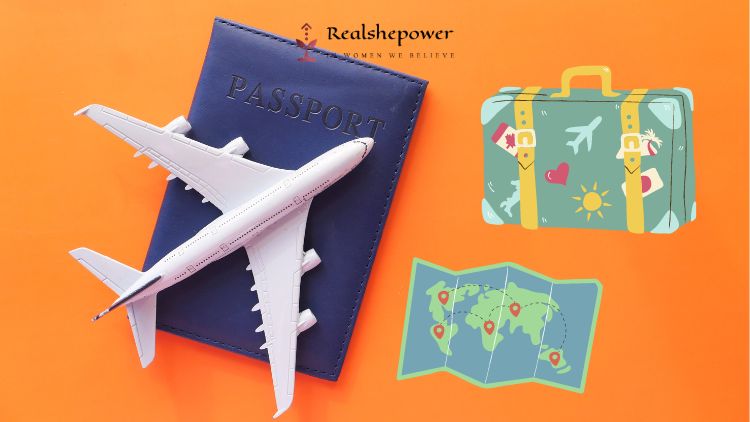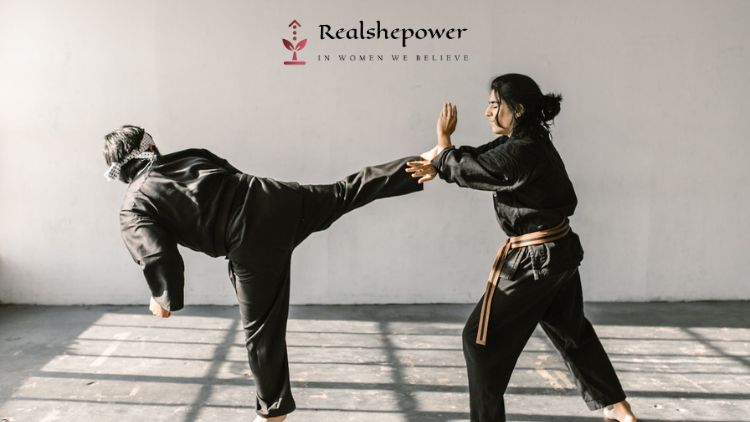How can women travel like nomads with confidence? Here are 7 must-know tips


Are you a woman who loves to travel and experience new cultures, but feel hesitant to go out on your own? Or maybe you’ve been thinking about becoming a nomad, but don’t know where to start? Look no further! In this article, we will share 7 must-know tips on how women can travel like nomads with confidence. From safety precautions to budgeting and packing strategies, these tips will help you feel empowered and prepared for your next adventure. So, whether you’re a seasoned traveler or just starting out, click here to learn how you can travel like a nomad with confidence.
Table of Contents
1. Research your destination:
Researching your destination is an important step in preparing for a trip as a nomad. Here are some things to consider when researching your destination:
- Safety: Research the safety of the destination, including crime rates and areas to avoid. It’s also a good idea to check the U.S. Department of State’s website for travel advisories and to register your trip with the STEP (Smart Traveler Enrollment Program) so that the embassy can assist you in case of an emergency.
- Culture: Learn about the local customs and culture to better understand and respect the people and traditions of the place you are visiting. This can also help you avoid any unintentional cultural faux pas.
- Transportation: Research transportation options at your destination, including how to get from the airport to your accommodation and how to get around the city. It’s also a good idea to research any transportation passes or discounts that may be available.
- Accommodation: Look into different accommodation options, such as hostels, Airbnb, or hotels. Consider your budget, location, and amenities when choosing a place to stay.
- Activities: Research activities and attractions in the area to help plan your itinerary and make the most of your trip. Look into any tickets or reservations that may be required in advance.
By doing thorough research before your trip, you can feel more confident and prepared as a nomad, which can help make your trip more enjoyable.
Read: 11 brain-twistingly brilliant travel ideas that will help you save more

2. Plan ahead:
Here are some things to consider when planning ahead:
- Budget: Determine a budget for your trip and make a plan for how you will pay for expenses, such as transportation, accommodation, and activities.
- Packing: Make a packing list and consider the climate, activities, and cultural customs of your destination. Pack light and consider bringing items that are versatile and can serve multiple purposes.
- Documentation: Make copies of important documents, such as your passport and travel insurance, and leave a copy with a trusted friend or family member. Consider storing electronic copies in a secure cloud storage service.
- Communication: Consider how you will stay in touch with loved ones while you are traveling. This may include setting up a phone plan with international coverage or using messaging and communication apps.
- Health: Consider your health and any potential medical needs while traveling. This may include getting any necessary vaccinations, packing any necessary medications, and researching medical facilities at your destination.
3. Learn some basic self-defense techniques:
Self-defense is an important skill to have, especially when traveling. Here are a few basic techniques that you can use to protect yourself while on the go:
- Use your surroundings to your advantage: Look for objects you can use as weapons, such as keys, pens, or even a sturdy umbrella. Consider your environment and try to create distance between yourself and your attacker.
- Yell for help: Make noise and draw attention to yourself. Try to get the attention of anyone nearby and try to get away from the attacker.
- Use body language: Stand tall, make eye contact, and try to project confidence. This can often deter an attacker from targeting you.
- Use basic strikes: If you are being attacked, use your elbows, fists, knees, or feet to strike vulnerable areas such as the face, throat, or groin.
- Run away: If you can, get away from the attacker as quickly as possible. Don’t worry about your belongings – they can be replaced. Your safety is the most important thing.
- Use your body weight: If you are pushed or grabbed, use your body weight to your advantage. Shift your weight to one side and use your body to push off and create distance between you and your attacker.
- Use pepper spray: Pepper spray is a good self-defense tool to have with you while traveling. It can temporarily blind and incapacitate an attacker, giving you time to escape.
Remember, the most important thing is to try to get away as quickly as possible. If you can’t get away, try to make as much noise as possible to attract attention and deter your attacker. If you are in a dangerous situation, it is always better to be proactive and try to prevent an attack from happening rather than waiting for it to occur.
It’s also important to remember that self-defense is about protecting yourself, not necessarily fighting. If you can, try to de-escalate the situation and avoid physical confrontation if possible. It’s always a good idea to take a self-defense class or two to learn more about how to protect yourself. Stay safe!
Read: 10 Basic self-defense skills that our children must learn

4. Stay connected:
Staying connected while traveling can help you feel more confident and secure, as it allows you to communicate with others, access information, and stay aware of your surroundings. Here are a few tips for staying connected while traveling:
- Use a local SIM card: If you’re traveling internationally, consider purchasing a local SIM card for your phone. This can be more cost-effective than using your regular plan, and it will also allow you to make calls and access the internet while you’re abroad.
- Use a VPN: A virtual private network (VPN) can help protect your online privacy and security while you’re traveling. It can also help you access websites that might be blocked in certain countries.
- Use messaging apps: Apps like WhatsApp, Skype, and Viber can be used to communicate with others while you’re traveling. These apps often allow you to make calls and send messages over Wi-Fi, so you don’t have to worry about using your data plan.
- Use a portable Wi-Fi hotspot: A portable Wi-Fi hotspot can be a convenient way to stay connected while you’re on the go. You can either purchase one or rent one from a local provider.
- Use offline maps: Downloading offline maps of the areas you’ll be visiting can be a helpful way to stay connected even when you don’t have an internet connection. Apps like Google Maps and Maps.me allow you to download maps for offline use.
Overall, staying connected while traveling can give you peace of mind and help you navigate unfamiliar places with confidence. Just be sure to use common sense and take steps to protect your privacy and security.
5. Trust your instincts:
If something doesn’t feel right, it’s important to listen to your gut and take steps to protect yourself. Here are a few tips for trusting your instincts while traveling:
- Pay attention to your surroundings: Keep an eye on your surroundings and be aware of any potential threats. Look for exits and escape routes in case you need to get away quickly.
- Trust your gut: If something doesn’t feel right, it’s usually better to err on the side of caution. If you’re uncomfortable in a situation or with a person, listen to your instincts and remove yourself from the situation if possible.
- Have a plan: It’s a good idea to have a plan in place for what you’ll do in an emergency. This could include having a designated meeting place with your travel companions, knowing how to call for help, and having an emergency contact list on hand.
- Stay alert: Avoid distractions like using your phone or listening to music with headphones while you’re in unfamiliar places. It’s important to stay alert and aware of your surroundings at all times.
- Stay in touch: Let someone know your itinerary and check in with them regularly. This can give you an extra layer of protection and allow someone to know where you are if something goes wrong.
Trusting your instincts and being prepared can help you travel with confidence and stay safe on the road.
Read: 10 Common Mistakes Women Make When Traveling Alone

6. Seek out other travelers:
There are several ways you can find other travelers to travel with, including:
- Join online travel groups or forums: There are many online travel groups or forums where you can connect with other travelers and discuss your plans and travel interests. Some popular options include Reddit’s “r/travel” subreddit and travel forums on websites such as Lonely Planet and TripAdvisor.
- Attend travel meetups or events: Many cities have travel meetups or events where you can meet other travelers and discuss your plans. You can search for these events on websites like Meetup or Facebook, or check with local hostels or travel agencies.
- Join a tour or group trip: Consider joining a tour or group trip, which can be a good way to meet other travelers and have a structured travel itinerary. Many tour companies offer group trips for solo travelers.
- Stay in hostels: Hostels are a popular option for budget travelers and can be a great place to meet other travelers. Many hostels have common areas where travelers can socialize and exchange travel stories and tips.
- Use social media: You can also use social media platforms like Facebook, Instagram, and Twitter to connect with other travelers and find potential travel partners. You can search for hashtags related to travel and reach out to people who have similar travel interests.
It’s important to be cautious when connecting with people online and to take steps to protect your personal safety. Consider meeting in a public place and telling a trusted friend or family member about your plans.
7. Learn some basic phrases in the local language:
Learning some basic phrases in the local language can be a helpful way to communicate with locals and navigate your travels with more confidence. Here are a few phrases that can be useful to know when traveling:
- Hello: “Hola” (Spanish), “Bonjour” (French), “Ciao” (Italian), “Ni hao” (Mandarin Chinese), “Konnichiwa” (Japanese)
- Goodbye: “Adiós” (Spanish), “Au revoir” (French), “Arrivederci” (Italian), “Zaijian” (Mandarin Chinese), “Sayonara” (Japanese)
- Please: “Por favor” (Spanish), “S’il vous plaît” (French), “Per favore” (Italian), “Qing” (Mandarin Chinese), “Onegai shimasu” (Japanese)
- Thank you: “Gracias” (Spanish), “Merci” (French), “Grazie” (Italian), “Xie xie” (Mandarin Chinese), “Arigato” (Japanese)
- Yes: “Sí” (Spanish), “Oui” (French), “Sì” (Italian), “Shi” (Mandarin Chinese), “Hai” (Japanese)
- No: “No” (Spanish), “Non” (French), “No” (Italian), “Bu” (Mandarin Chinese), “Iie” (Japanese)
- How much does it cost?: “Cuánto cuesta?” (Spanish), “Combien ça coûte?” (French), “Quanto costa?” (Italian), “Duoshao qian?” (Mandarin Chinese), “Ikura desu ka?” (Japanese)
- Do you speak English?: “Hablas inglés?” (Spanish), “Parlez-vous anglais?” (French), “Parli inglese?” (Italian), “Ni hui yingwen ma?” (Mandarin Chinese), “Eigo ga hanasemasu ka?” (Japanese)
- Where is the bathroom?: “Dónde está el baño?” (Spanish), “Où se trouve les toilettes?” (French), “Dove si trova il bagno?” (Italian), “Weisheng jian zai nar?” (Mandarin Chinese), “Toire wa doko desu ka?” (Japanese)
Remember that different countries and regions may have different dialects and variations of these phrases, so it’s always a good idea to do some research before your trip. It’s also helpful to carry a phrasebook or use a language translation app, such as Google Translate, to help you communicate.
Overall, the key is to be prepared and to take care of yourself. With some planning and awareness, you can feel confident and empowered as you explore new places.
Tips to make travelling a more enjoyable experience

You can now write for RSP Magazine and be a part of the community. Share your stories and opinions with us here.
